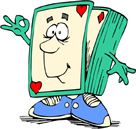| |
Compound Probabilities (with more than one outcome, or desired result within a trial ):
• The probability of rolling an even number on a die, then tossing a head on a penny. (3/12 = 1/4)
• The probability of tossing three pennies and getting at least 2 heads.
(4/8 = 1/2)
• The probability of drawing a heart from a deck of cards, replacing the card,
then drawing a spade. (169/2704 = 1/16)
• The probability of drawing a red ace from a deck of cards, not replacing
the card, then drawing a black ace. (2/52 • 2/51 = 4/2652 = 1/663)
|
 |
